Sign up for our listserv to receive a link to join our colloquia and receive announcements about future talks and events.
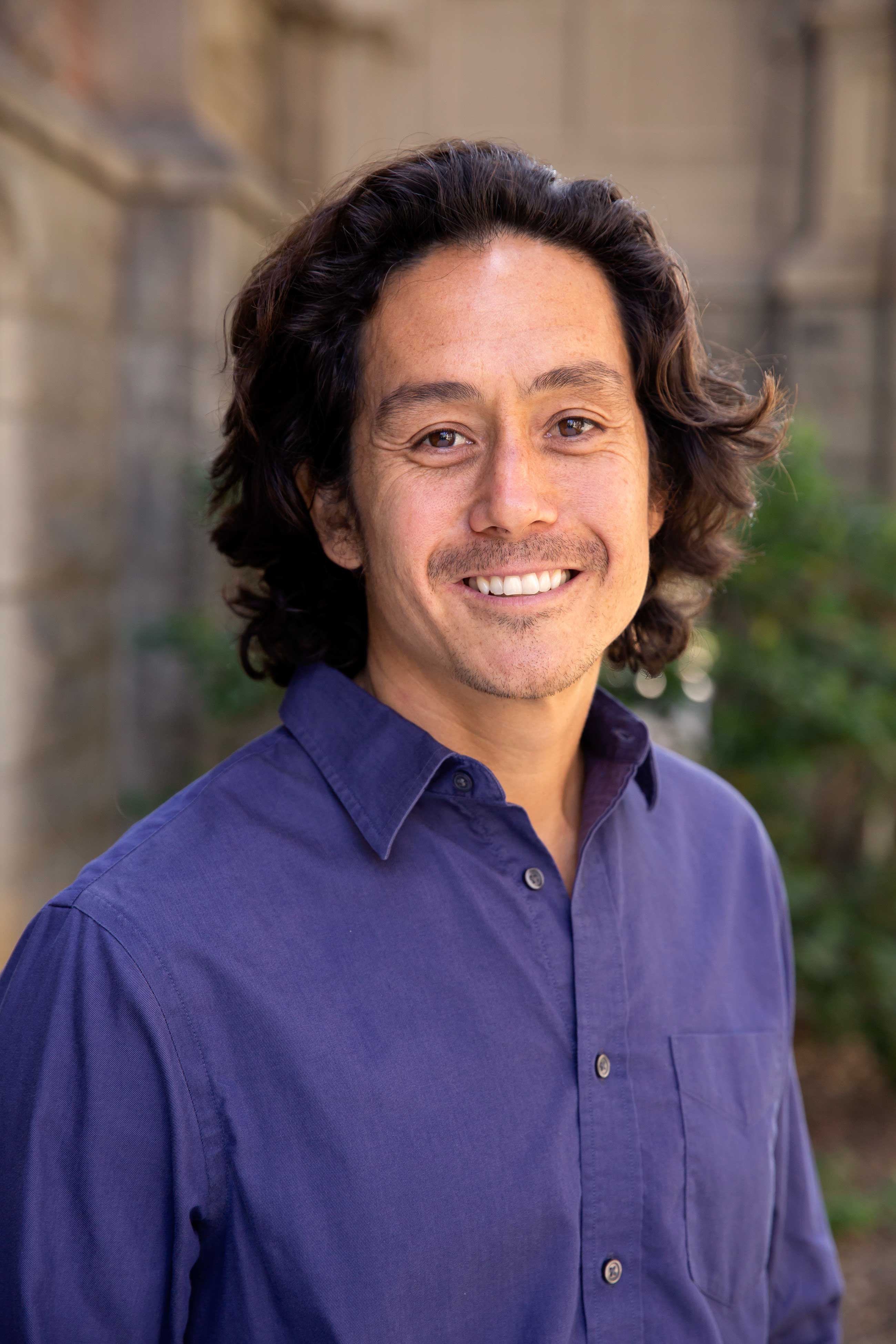
Joshua Blumenstock
Chancellor's Associate Professor, UC Berkeley
Date: Thursday, December 14th 2023, 10 AM PT / 13 PM ET / 6 PM WAT / 7 PM CET
Joshua Blumenstock is a Chancellor's Associate Professor at the U.C. Berkeley School of Information and the Goldman School of Public Policy. He is the Co-director of the Global Policy Lab and the Center for Effective Global Action. Blumenstock does research at the intersection of machine learning and empirical economics, with a focus on how novel data and technology can better address the needs of poor and vulnerable people around the world. He has a Ph.D. in Information Science and a M.A. in Economics from U.C. Berkeley, and Bachelor's degrees in Computer Science and Physics from Wesleyan University. He is a recipient of awards including the NSF CAREER award, the Intel Faculty Early Career Honor, and the U.C. Berkeley Chancellor's Award for Public Service. His work has appeared in general interest journals including Science, Nature, and Proceedings of the National Academy of Sciences, as well as top economics journals (e.g., the American Economic Review) and computer science conferences (e.g., ICML, KDD, AAAI, WWW, CHI).
Applications of Machine Learning to the Targeting of Humanitarian Aid
Targeting is a central challenge in the design of humanitarian programs: given available data, how does one identify the individuals and households with the greatest need for assistance? Here we show that machine learning, applied to non-traditional data from satellites and mobile phones, can improve the targeting of anti-poverty programs. Our analysis is based on data from three field-based projects—in Togo, Afghanistan, and Kenya—that illustrate the promise, as well as some of the potential challenges, of this new approach to targeting. Collectively, the results highlight the potential for new data sources to improve humanitarian response efforts, particularly in crisis settings when traditional data are missing or out of date.
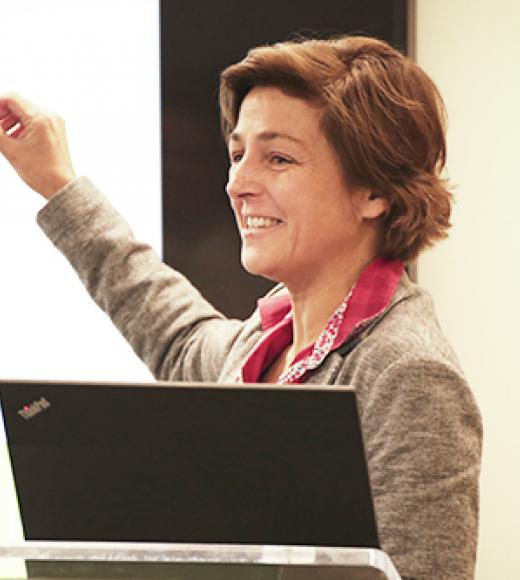
Karen Macours
Chaired Professor, Paris School of Economics
Date: Tuesday, November 28th 2023, 9 AM PT / 12 PM ET / 5 PM WAT / 6 PM CET
Karen Macours is a chaired professor at the Paris School of Economics (PSE), and senior researcher (directrice de recherche) at the French National Research Institute for Agriculture, Food and Environment (INRAE). Her research focuses on agricultural productivity and rural poverty reduction in developing countries, impact assessment related to agricultural R&D, the evaluation of programs addressing households' productive and human capital investments (early childhood, health, nutrition, education) and related measurement and methodological questions. She currently serves as the chair of the CGIAR's Standing Panel on Impact Assessment (SPIA), co-chair of the health sector and the Learning for All Initiative and board member of JPAL (Abdul Latif Jameel Poverty Action Lab), member of the board of directors of BREAD (Bureau for Research and Economic Analysis of Development) and the Feed the Future Innovation Lab for Market Risk and Resilience, and is an affiliate of CEPR (Center for Economic Policy Research) and EUDN (European Universities Development Network). She is co-editor of the Journal of Development Economics, and associate editor of the American Journal of Agricultural Economics, and co-organizer of the Virtual Development Economics Seminar Series: VDEV/CEPR/BREAD. She previously was associate professor of international economics at SAIS-Johns Hopkins University. She received her MS in Agricultural Engineering from the K.U. Leuven and her PhD in Agricultural and Resource Economics from the University of California at Berkeley.
Measuring the Long-run Impact of Cash Transfers
Cash transfer programs are the prime example of a social innovation that has scaled rapidly across the globe. Such programs often have multiple objectives, from providing short-term safety nets to the long-term ambition of breaking the intergenerational transmission of poverty. A lot of empirical evidence has been accumulated on the short term goals. 25 years after the start of the first national programs in Mexico and Brazil, we can also start taking stock of the long-term objectives. This presentation will first discuss the methodological challenges for studying long-term returns, focusing on common pitfalls and potential solutions. It will then lay out a framework to consider the different pathways and mechanisms towards long-term returns to clarify the type of outcomes and contextual variables to measure both on the intermediate and long run. Given the complexity and multi-dimensionality of the theory-of-change for long-term impacts, we then draw lessons from different studies, following the framework. We first highlight the evidence on long-term returns to conditional cash transfers (CCTs) that operate through returns on investments in education and skills. A lot of this evidence draws on the first generation of CCTs in Latin America, but we also link to the emerging evidence from other regions. We then turn to evidence on unconditional cash transfers (UCTs), which is particularly prominent for Sub-Saharan Africa, focusing on a wider set of investments and behavioral changes with evidence on impacts years after the end of the transfers.
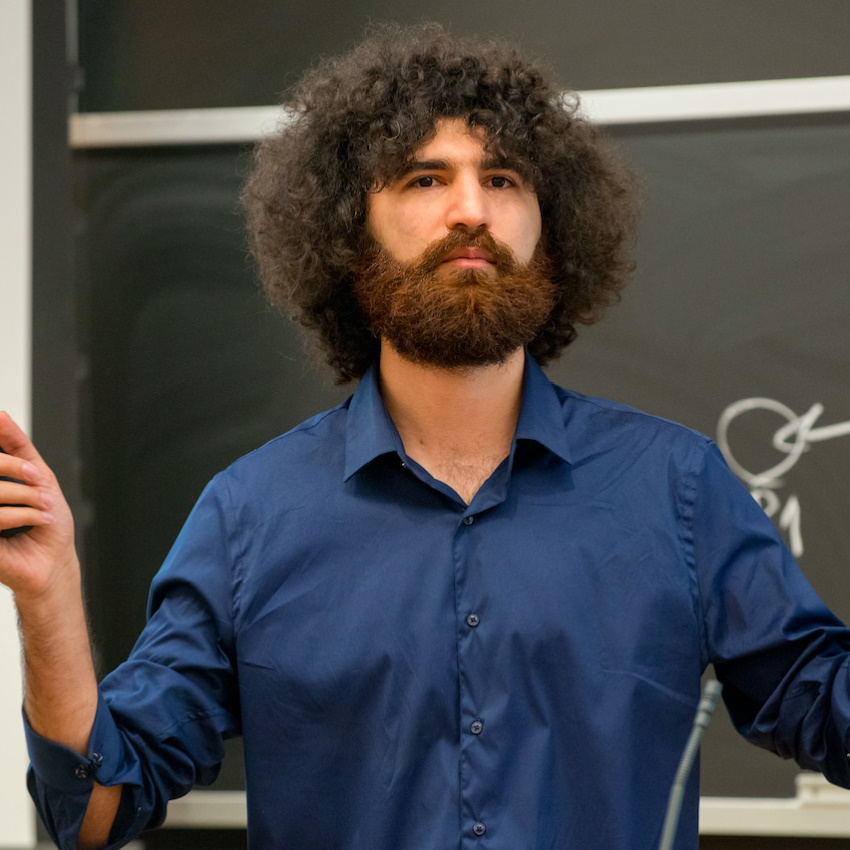
Mohammad Akbarpour
Associate Professor of Economics, Stanford University
Date: Friday, February 24th 2023, 9AM PT / 12 PM ET / 6 PM CET / WAT
Mohammad Akbarpour is an associate professor of economics at Stanford GSB and (by courtesy) an associate professor of computer science at Stanford. His research bridges between economic theory and practical market design. In particular, his work on credible auctions (best paper award, EC'18) has been a subject of recent lawsuits in the market for online ads, and his kidney exchange research has inspired real-world kidney allocation algorithms. More recently, he has been working on the implications of inequality for market design, with applications in rent control, public housing, and vaccines allocation. In 2020, he was elected as a Sloan research fellow.
Inequality-aware mechanism design: an economic framework for vaccine prioritization
Economists typically prescribe prices for guiding the allocation of scarce resources, arguing that the implicit selectivity of the price system helps allocate resources to those who value them the most. However, in many contexts, considerations such as fairness, equity, or consumption externalities provide arguments against using prices—and indeed, many ethicists and policy-makers opt for schemes that allocate resources free of charge to certain selected groups. The price system, they argue, directs resources to those who are able to pay the most, which may not match up with true needs or moral desert. The question of whether to use prices or priorities played out in the context of allocating vaccines during the Covid-19 pandemic. Although prices could help identify individuals with the highest private values for vaccines, most countries opted for a priority system with rationing. This paper derives the optimal scheme from economic primitives. The key insight is that while social considerations may indeed limit the role that prices play in the optimal mechanism, they are typically not sufficient to rule out prices completely. As a result, a priority system with rationing may coexist with a pricing scheme; such a hybrid mechanism allows the designer to leverage observable information while simultaneously screening for unobservable characteristics.
Ruchit Nagar
Yale New Haven Hospital Resident and Founder of Khushi Baby
Date: Friday, March 24th 2023, 9 AM ET / 2 PM WAT/CET
Youtube Video: Link
Ruchit Nagar, MD, MPH is a combined internal medicine and pediatrics resident at Yale. He is also the co-founder and CEO at Khushi Baby, a digital health non-profit working as the technical support partner to the Department of Health of India's largest state, Rajasthan. Ruchit trained at Harvard and Yale for his medical and public health degrees respectively. He's been recognized as a Forbes 30under30 leader in healthcare and distinguished young alumnus at the Yale School of Public Health. His interests include critical care, health systems change, impact evaluation, and machine learning for global health.
Unlocking Precision Public Health in Rajasthan, India
Public health in India is undergoing a digital transformation. Community health workers, newly equipped with smartphones, are now reporting beneficiary-level data with village level granularity, in real-time. This talk will explore how Khushi Baby, the technical support partner to the Department of Health in Rajasthan, India, and collaborators, are using this new big data, from over 70K community health workers, to drive insights at the beneficiary, health-worker, and community level.

Aurelio Nuño Mayer
Visiting Scholar at Harvard University and Former Minister of Public Education in Mexico
Date: Friday, April 14th 2023, 12 PM ET / 5 PM WAT / 6 PM CET
Youtube Video: Link
The Hidden Paradox of Education and Democracy: The Politics of Mobilization, Educational Quality, and Liberty
Aurelio Nuño Mayer is a Visiting Scholar at Harvard University and the Former Minister of Public Education in Mexico (August 2015 to December 2017). Aurelio Nuño received a degree in political science and administration at the Universidad Iberoamericana, and he later earned a master's degree at University of Oxford (UK). He articulated one of the most comprehensive and ambitious education reforms in many decades in Mexico. The reform consisted of five structural changes: 1) a new national curriculum for the Twenty-First Century skills; 2) a new merit-based professional system for training, hiring and promoting teachers; 3) a new model of school organization; 4) a national strategy for inclusion and equity; and 5) a new model of governance within the education system. Currently, he is a visiting scholar at the Harvard Graduate School of Education and he is writing a book on the politics of education.
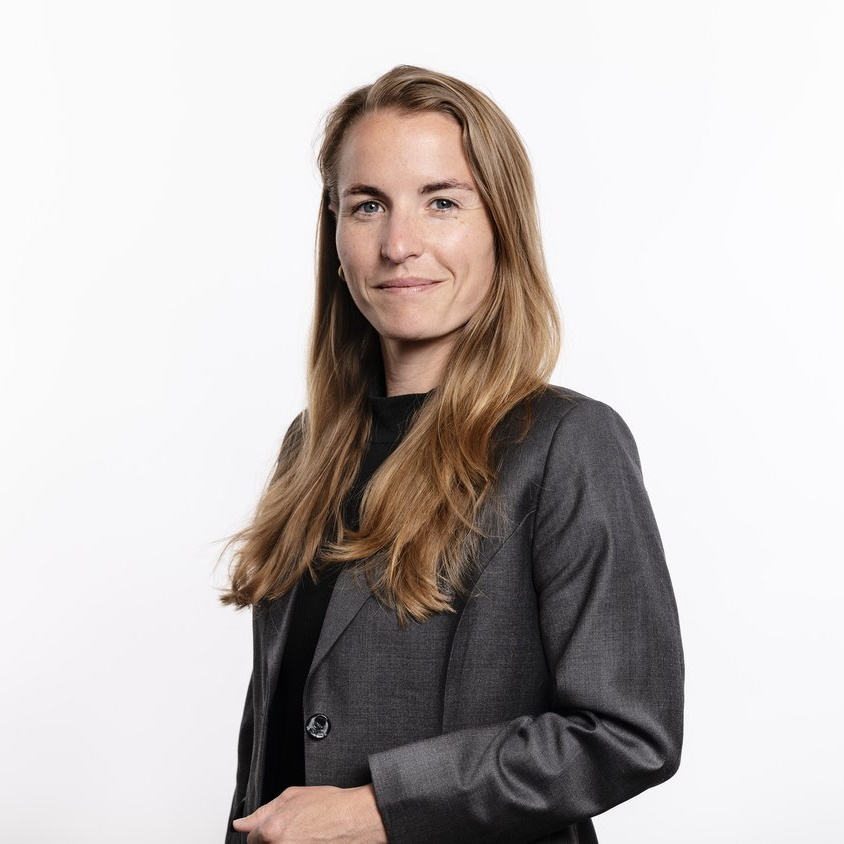
Hilary Faxon
Assistant Professor of Environmental Social Science University of Montana
Date: Friday, May 5th 2023, 12 PM ET / 5 PM WAT / 6 PM CET
Youtube Video: Link
Hilary Faxon is an Assistant Professor of Environmental Social Science at the University of Montana, currently on leave as a Marie Sklodowska-Curie Fellow in the Department of Food and Resource Economics at the University of Copenhagen. Hilary's research, teaching and public scholarship investigate environment, development and technology with a focus on social justice in the Global South.
Small Farmers, Big Tech: rural livelihoods and networked protest in Myanmar
While much social science to date on the digitization of agriculture has focused on large agribusiness, farms under two hectares account for 84% of farms worldwide and produce about 35% of the world's food. Many small farmers are located in the Global South, where land provides a source of sustenance and site of home. Understanding the implications of increasing digital connection is critical for understanding rural economies, societies, and politics. This talk draws on a decade of anthropological and participatory research with farmers, activists and policymakers in Myanmar to discuss how digital connection is shifting rural economics, culture, and politics, before and after the 2021 military coup.
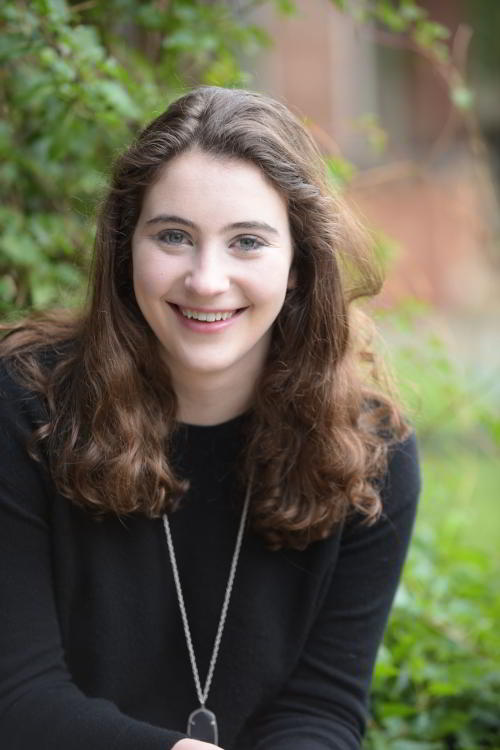
Elissa Redmiles, Max Planck Institute for Software Systems
Date: Friday, December 9th 2022, 12 PM ET / 5 PM WAT / 6 PM CET
Dr. Elissa M. Redmiles is a faculty member and research group leader at the Max Planck Institute for Software Systems and a Visiting Scholar at the Berkman Klein Center for Internet & Society at Harvard University. She uses computational, economic, and social science methods to understand users' security, privacy, and online safety-related decision-making processes and remedy inequities in those processes. Her work has been recognized with multiple paper awards at USENIX Security, ACM CCS and ACM CHI and has been featured in popular press publications such as the New York Times, Wall Street Journal, Scientific American, Rolling Stone, Wired, Business Insider, and CNET.
Sex, Work, and Technology: Lessons for Internet Governance & Digital Safety
Sex workers sit at the intersection of multiple marginalized identities and make up a sizable workforce: the UN estimates that at least 42 million sex workers are conducting business across the globe. Sex workers face a unique and significant set of digital, social, political, legal, and safety risks; yet their digital experiences have received little study in the CS and HCI literature. In this talk we will review findings from a 2-year long study examining how sex workers who work in countries where sex work is legal (Germany, Switzerland, the UK) use technology to conduct business and how they have developed digital strategies for staying safe online and offline. We will then describe how these findings can inform broader conversations around internet governance, digital discrimination, and safety protections for other marginalized and vulnerable users whose experiences bisect the digital and physical.
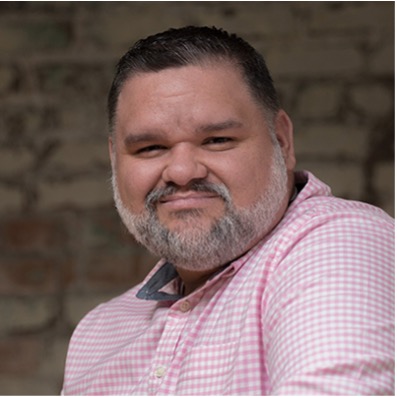
Edward J. "Kingfish" Lada Jr., President and Chief Executive Officer at Goodwill
Date: Thursday, November 10th 2022, 2 PM ET / 8 PM WAT / 8 PM CET
Ed Lada is president and CEO of Goodwill Keystone Area, a 74-year-old non-profit social enterprise serving 22 counties, employing over 1500 people, and serving thousands of people a year. Ed is recognized throughout the Goodwill movement for his work to revolutionize the traditional nonprofit by utilizing powerful technologies like robotics, artificial intelligence by way of computer vision machine learning, and virtual and augmented reality. During his stint as CEO of the Goodwill of Western Missouri and Eastern Kansas, Ed created the Artemis Initiative in Kansas City, a first-of-its-kind workforce development training institute designed to empower the workforce of tomorrow by preparing job seekers on emerging technologies. Ed continues to grow Goodwill's tremendous legacy by leveraging technologies to augment the human experience, not replace it, and to create truly integrated and inclusive work environments. Ed is passionate about giving those who are disenfranchised a head start in an increasingly evolving technological world and, in doing so, creating a pathway to generational wealth and breaking the cycle of poverty.
Goodwill and A.I.: A chat about workforce development for the future and modernizing a 100-year-old brand
Ed "Kingfish" Lada, Jr., President and CEO for Goodwill Keystone Area and Goodwill Keystone Area Foundation in Central and Southeastern PA, discusses how A.I. (in particular computer vision machine learning), has been explored within his non-profit organizations to modernize operations while also creating pathways to the future of workforce development. Goodwill is a $7b federated non-profits in North America that are the original social enterprise. In this session, Ed will share his journey doing R&D, Goodwill's path forward, and why it is imperative that the technology is viewed as an augmentation of the human experience, not the replacement of the human experience.

Samara Trilling and Johanna Monge, Justfix
Discussant: Daniel Waldinger, NYU
Date: Friday, May 27th 2022, 1 PM ET / 6 PM WAT / 7 PM CET
Youtube Live: Link
Samara Trilling (she/her) is a software engineer and policy technologist. As a fellow at the Aspen Tech Policy Hub, Samara wrote policy recommendations for machine learning regulation. Previously, Samara built city planning software at Sidewalk Labs and Google Fiber. Samara has a degree in computer science from Columbia University with a specialization in artificial intelligence. Samara loves hiking, collects books on the history of computing, and plans to build a tiny house and tow it around with her electric truck.
Johanna Monge (she/her/ella), a lifelong Queens gal, daughter of Peruvian immigrants and tenant organizer, integrates her passion for transformative justice into all her work. She co-founded Astoria Tenant Union at the start of the COVID-19 pandemic utilizing the skills she gained from organizing in Inwood and Washington Heights while at the Metropolitan Council on Housing. She graduated from Clark University with an honors degree in Political Science and Urban Development.
Daniel Waldinger is an empirical economist working at the intersection of market design, industrial organization, and public finance. His research has focused on the design of waiting lists for public housing and organ transplants. Daniel joined the NYU economics department as an assistant professor in Fall 2019 after a post-doc year at the NYU Furman Center. Daniel holds a PhD in Economics from MIT and a Bachelor's Degree from the University of Chicago.
Type three social change: tech's role in tenant organizing at JustFix
JustFix's work building anti-eviction web apps early in the pandemic led us to change our philosophy on how tech can best serve tenants. We experienced the mismatch between legislative and software dev cycles (not the way you'd think.), the limits of organizing within the system, and the power of open data to put external pressure on bad landlords and brokers. In this talk, we'll preview some of JustFix's new tool ideas that fit this "type three" paradigm of working outside existing systems to push for housing justice. The discussion will be moderated by Daniel Waldinger in bridging social, economic, and policy perspectives on public housing allocation.
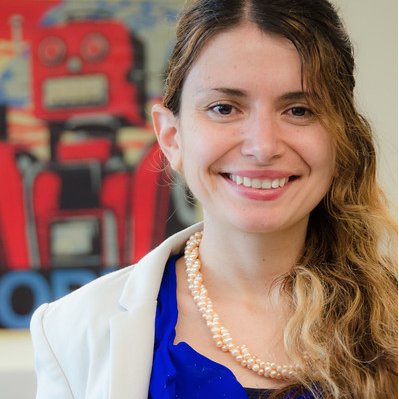
Saiph Savage, Northeastern University
Date: Friday, April 29th 2022, 12 PM ET / 5 PM WAT / 6 PM CET
Youtube Live: Link
Saiph Savage is an Assistant Professor at Northeastern University in the Khoury College of Computer Sciences where she conducts research in the intersection of Human Computer Interaction, A.I., and Civic Technology. She is one of the 35 Innovators under 35 by the MIT Technology Review, a Google Anita Borg Scholarship recipient, and a fellow at the Center for Democracy & Technology. Her work has been covered in the BBC, Deutsche Welle, the Economist, and the New York Times, as well as published in top venues such as ACM CHI, CSCW, and the Web Conference, where she has also won honorable mentions and impact awards. Dr. Savage has been awarded grants from the National Science Foundation, the United Nations, diverse industry actors, and has also formalized new collaborations with Federal and local Governments where she is driving them to adopt Human Centered Design and A.I. to deliver better experiences and government services for citizens. Dr. Savage students have obtained fellowships and internships in industry (Facebook Research, Twitch Research, Twitter, Snap, and Microsoft Research) as well as academia (Oxford Internet Institute). Saiph holds a bachelor's degree in Computer Engineering from the National Autonomous University of Mexico (UNAM), and a master's and Ph.D. in Computer Science from the University of California, Santa Barbara (UCSB). Dr. Savage has also worked at the University of Washington, and Carnegie Mellon University (CMU). Additionally, Dr. Savage has been a tech worker at Microsoft Bing, Intel Labs, and a crowd research worker at Stanford.
The Future of A.I. for Social Good
The A.I. Industry has powered a futuristic reality of self-driving cars and voice assistants to help us with almost any need. However, the A.I. Industry has also created systematic challenges. For instance, while it has led to platforms where workers label data to improve machine learning algorithms, my research has uncovered that these workers earn less than minimum wage. We are also seeing the surge of A.I. algorithms that privilege certain populations and racially exclude others. If we were able to fix these challenges we could create greater societal justice and enable A.I. that better addresses people's needs, especially groups we have traditionally excluded. In this talk, I will discuss some of these urgent global problems that my research has uncovered from the A.I. Industry. I will present how we can start to address these problems through my proposed "A.I. For Good" framework. My framework uses value sensitive design to understand people's values and rectify harm. I will present case-studies where I use this framework to design A.I. systems that improve the labor conditions of the workers operating behind the scenes in our A.I. industry. I conclude by presenting a research agenda for studying the impact of A.I. in society; and researching effective socio-technical solutions in favor of workers.
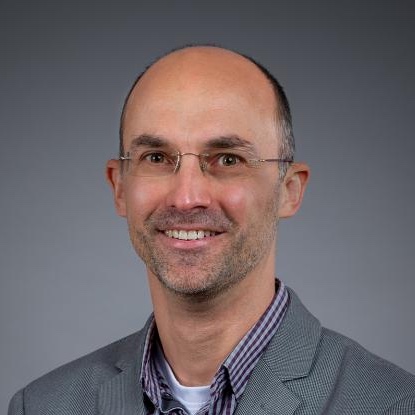
Ingmar Weber, Qatar Computing Research Institute
Date: Tuesday, February 22nd 2022, 12 PM ET / 5 PM WAT / 6 PM CET
Youtube Live: Link
Ingmar Weber is the Research Director for Social Computing at the Qatar Computing Research Institute (QCRI). His interdisciplinary research looks at what online user-generated data can tell us about the offline world and society at large. Working closely with sociologists and demographers he has pioneered the use of online advertising data for complementing official statistics on international migration, digital gender gaps, and poverty. Analyses performed by his team have been used to improve operations by UN agencies and NGOs ranging from Colombia to the Philippines. Prior to joining QCRI, Ingmar was a researcher at Yahoo Research Barcelona. As an undergraduate he studied mathematics at the University of Cambridge before pursuing a PhD at the Max-Planck Institute for Computer Science. He is an ACM Distinguished Member.
Collected for Profit, Repurposed for Social Good: Using Advertising Data to Monitor International Development
Most of the big internet companies, such as Facebook, Google, or Twitter, generate their revenue from targeted advertising. To offer advertisers with advanced targeting capabilities, these companies collect large amounts of user data to build elaborate profiles. Based on these profiles an advertiser can then choose to target only, say, female Facebook users living in Norte de Santander who are aged 18-24, who used to live in Venezuela, and who have access to an iOS device. To help advertisers in planning their advertising campaigns and the related budget needs, the advertising platforms provide so-called audience estimates on how many of their users match the provided targeting criteria. In the example above, Facebook estimates that there are 1,800 matching monthly active users (as of Mid-December 2021). In this talk, I'll describe how, in close collaboration with different UN agencies, we're tapping into these audience estimates to (i) monitor international migration, (ii) track digital gender gaps, and (iii) map wealth inequalities. We consistently find that, despite fake profiles, and noise in the inference algorithms, data derived from the advertising platforms can provide valuable information that is complementary to other data sources. So data collected for the explicit purpose of selling advertisements and profit maximization can be repurposed for social good. At the same time, our work shows the risk of identifying vulnerable groups, rather than individuals, which is often not adequately considered in discussions focused on individual privacy. Furthermore, it raises questions on what the relationship between internet giants and statistical offices should be.
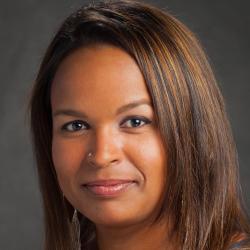
Maria Rodriguez, University at Buffalo
Date: Friday, May 7th 2021, 1 PM ET / 6 PM WAT / 7 PM CET
Dr. Rodriguez is an Assistant Professor at the University at Buffalo's School of Social Work (SUNY). She is also a faculty associate at the BerkmanKlein Center for Internet and Society, a faculty fellow at the Center for Democracy and Technology, and a member of the Twitter Academic Research Advisory Board. Her research is at the intersection of applied demography, computational social science, and social policy. The first line of research examines the ethical implications of algorithmic decision-making in human services, child welfare in particular. The second line of research looks at the lived experience of marginalized communities as self-reported on social media. The through line between the two concerns the methods involved: she identifies as a methodologist in social work spaces, in as far as her substantive focus is how computational methods can support using large, unstructured data to scale social work interventions. For that reason Rodriguez founded the caretLAB, the first lab housed in a school of social work to her knowledge dedicated to computational research methods in the public interest. Her lab works with technologists across fields of inquiry to leverage cutting edge, innovative technologies to develop, implement, and evaluate scaled interventions.
The Limits of Moral Philosophy in dealing with Algorithmic Bias
A great number of academic and industry initiatives seek to mitigate what are increasingly understood as ethical concerns in the development, implementation, and evaluation of algorithms in social contexts. Often, when confronted with questions of ethics within these socio-technical systems, engineers ,data scientists, and others turn to the field of Philosophy for help in trying to decide the balance between the right thing to do and what we can do. In this talk, Dr. Rodriguez presents her arguments for why most strands of moral philosophy are ill equipped to help us deal with the realities of algorithmic bias. Her arguments use evidence gleaned from years of professional experience in human services, her study of moral philosophy, as well as arguments put forth by a school of Black Philosophers. The aim of the talk is to introduce the audience to more contextual forms of philosophizing, ones grounded in the realities of marginalized existence.

Vukosi Marivate, University of Pretoria, South Africa
Date: Friday, April 9th 2021, 11:00 - 12:15 PM ET / 5-6:15 PM CET/WAT)
Youtube Live: Link
Vukosi Marivate holds a PhD in Computer Science (Rutgers University, as Fulbright Science and Technology Fellow) and MSc & BSc in Electrical Engineering (Wits University). Dr Marivate is based at the University of Pretoria as the UP ABSA Chair of Data Science. He works on developing Machine Learning/Artificial Intelligence methods to extract insights from data. A large part of his work over the last few years has been in the intersection of Machine Learning and Natural Language Processing (NLP). This has led to research outputs focused on how we can better improve low resource language tools, especially for African Languages. This has included creating new software libraries, new research approaches for robust NLP and encouraging the development of datasets for African languages. As part of his vision for the ABSA Data Science chair, Vukosi is interested in Data Science for Social Impact (https://dsfsi.github.io/), using local challenges as a springboard for research. In this area, Vukosi has worked on projects in science, energy, public safety and utilities. Vukosi is cofounder of the Deep Learning Indaba, the largest Machine Learning/Artificial Intelligence workshop on the African continent, aiming to strengthen African Machine Learning.
Coming to grips with the reality of Data Science - It's people all the way down
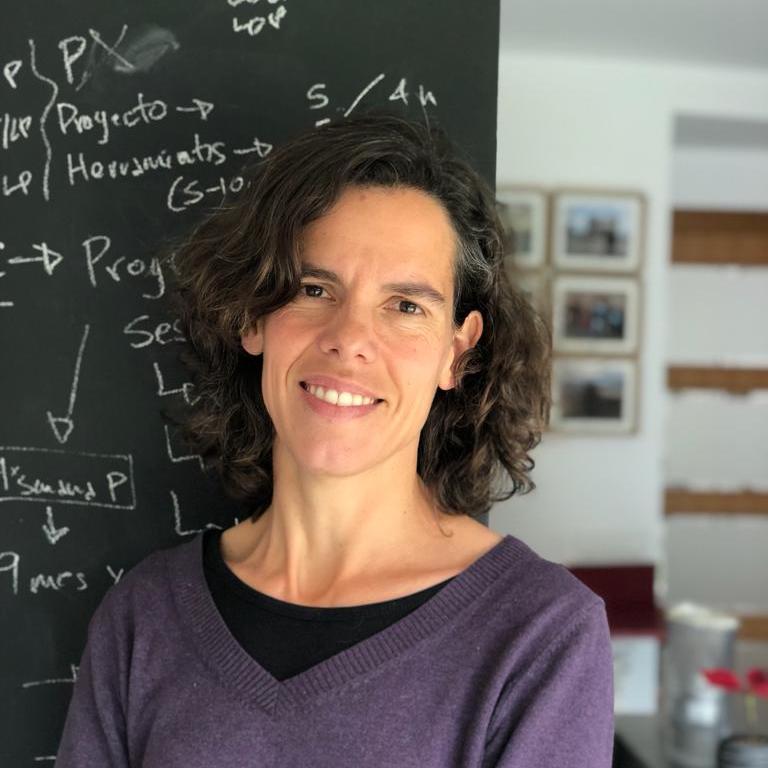
Caterina Calsamiglia, Institute of Political Economy and Governance, Barcelona
Date: Friday, March 19th 2021, 12:00 - 1:15 PM ET / 6-7:15 PM CET/WAT
Youtube Live: Link
Caterina Calsamiglia is an ICREA Research Professor at IPEG. She got her PhD from the Department of Economics at Yale University. Her research focuses on market design and public policy design with a particular interest in education. Her work includes theoretical, experimental and empirical analysis. In the recent years she has been leading a research initiative to help develop Pentabilities in life-long learning processes. To assist the Pentabilities initiative she co-founded Pentabilities app, a tool to track analyse the development of your pentabilities.
The design of university entrance exams and its implications for gender gaps (joint with Andreu Arenas)

Tina Eliassi-Rad, Northeastern University
Date: Friday, February 19 2021, 12:00-1:15 PM ET
Tina Eliassi-Rad is a Professor of Computer Science at Northeastern University in Boston, MA. She is also a core faculty member at Northeastern's Network Science Institute. Prior to joining Northeastern, Tina was an Associate Professor of Computer Science at Rutgers University; and before that she was a Member of Technical Staff and Principal Investigator at Lawrence Livermore National Laboratory. Tina earned her Ph.D. in Computer Sciences (with a minor in Mathematical Statistics) at the University of Wisconsin-Madison. Her research is at the intersection data mining, machine learning, and network science. She has over 100 peer-reviewed publications (including a few best paper and best paper runner-up awardees); and has given over 200 invited talks and 14 tutorials. Tina's work has been applied to personalized search on the World-Wide Web, statistical indices of large-scale scientific simulation data, fraud detection, mobile ad targeting, cyber situational awareness, and ethics in machine learning. Her algorithms have been incorporated into systems used by the government and industry (e.g., IBM System G Graph Analytics) as well as open-source software (e.g., Stanford Network Analysis Project). In 2017, Tina served as the program co-chair for the ACM SIGKDD International Conference on Knowledge Discovery and Data Mining (a.k.a. KDD, which is the premier conference on data mining) and as the program co-chair for the International Conference on Network Science (a.k.a. NetSci, which is the premier conference on network science). In 2020, she served as the program co-chair for the International Conference on Computational Social Science (a.k.a. IC2S2, which is the premier conference on computational social science). Tina received an Outstanding Mentor Award from the Office of Science at the US Department of Energy in 2010; and became a Fellow of the ISI Foundation in Turin Italy in 2019.
What can science do for democracy?
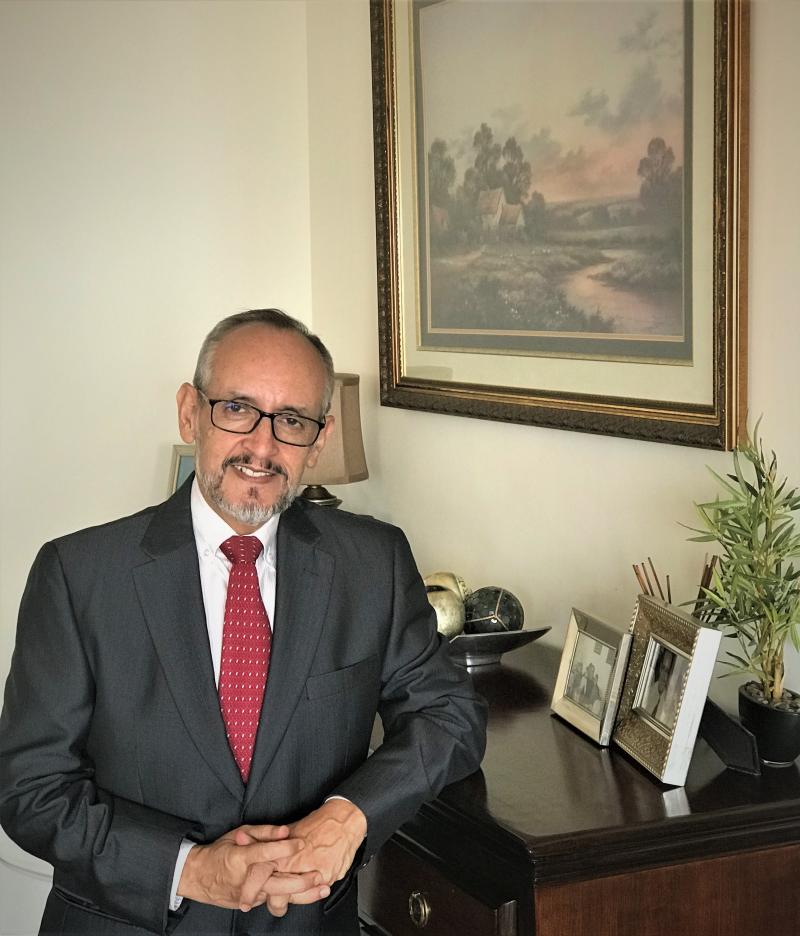
Francisco Marmolejo, The Qatar Foundation
Date: January 22 2021, 11 AM - 12:15 PM ET (5-6:15 PM WAT/CET)
Youtube Live: Link
Francisco Marmolejo is since February 2020, Education Advisor of Qatar Foundation, based in Doha, Qatar, providing support and advice towards the enhancement of the overall education strategy of QF and its unique eco-system of innovative education. Previously (2012-20), he worked at the World Bank, where he served as the Global Higher Education Coordinator and Lead, based in Washington, DC., and more recently as Lead Higher Education Specialist for India and South Asia, based in Delhi. From 1995 to 2002, he served as founding Executive Director of the Consortium for North American Higher Education Collaboration, a network of more than 160 universities mainly from Canada, USA and Mexico, based at the University of Arizona, where he also worked as Assistant Vice President, Affiliated Researcher at the Center for the Study of Higher Education, and Affiliate Faculty at the Center for Latin American Studies. Previously, he has been American Council on Education Fellow at the University of Massachusetts, Academic Vice President of the University of the Americas in Mexico, and International Consultant at OECD in Paris. He has received honorary doctorate degrees from his Alma Mater, the University of San Luis Potosi, and the University of Guadalajara in Mexico.
Bridging research and practice in the post-pandemic world: challenges for higher education institutions

Moon Duchin, Tufts University
Date: Friday, November 13 2020, 1:30-2:45 PM ET
Moon Duchin is a mathematician at Tufts University with affiliations in Science, Technology, and Society; Race, Colonialism, and Diaspora; and the Tisch College of Civic Life. She runs the MGGG Redistricting Lab at Tisch. Moon's mathematical background is in geometric group theory and low-dimensional topology. Her lab works on data science for civil rights, incorporating mathematics, computing, geography, law, and policy in its research program. Recent projects include gerrymandering metrics, Voting Rights Act analysis, and disclosure avoidance in the Census.
Differential privacy comes to the U.S. Census
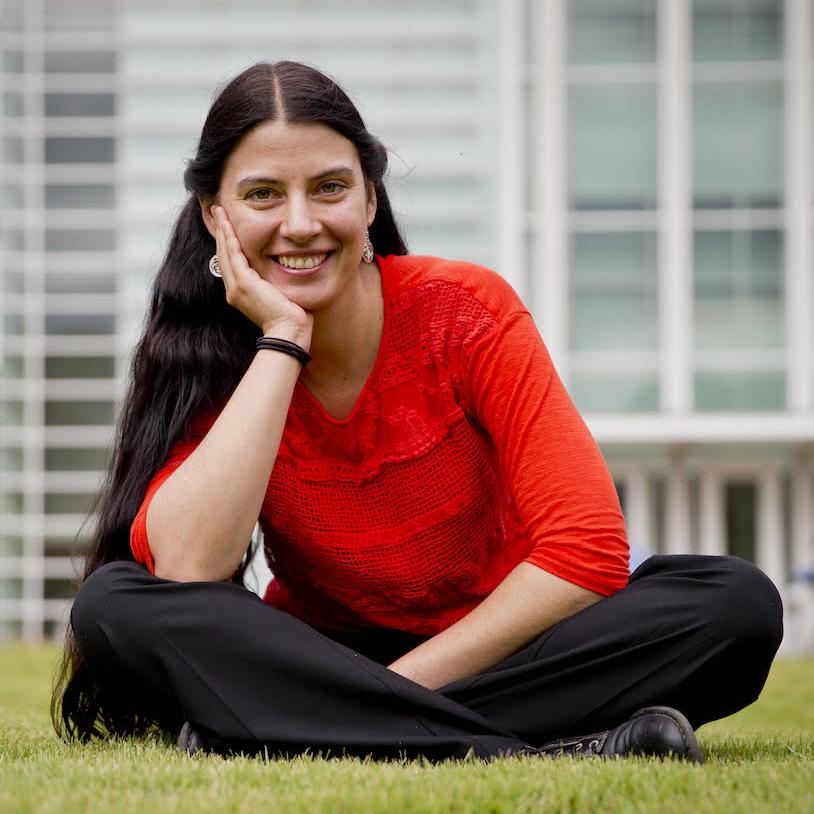
Special Talk: Bistra Dilkina, University of Southern California
Date: Friday, October 30 2020, 12:00-1:15 PM ET
Youtube Live: Link
Reflections on the talk: Medium
Bistra Dilkina is a Gabilan Associate Professor of Computer Science at the University of Southern California. She is also Co-Director of the Center for AI in Society (CAIS). Before that, Dilkina was an Assistant Professor in the College of Computing at the Georgia Institute of Technology and a co-director of the Data Science for Social Good Atlanta summer program. She received her PhD from Cornell University in 2012, and was a Post-Doctoral Associate at the Institute for Computational Sustainability until 2013. Dilkina is one of the junior faculty leaders in the young field of Computational Sustainability, and has co-organized workshops, tutorials, special tracks at AAAI and doctoral consortium on Computational Sustainability. Her work spans discrete optimization, network design, stochastic optimization, and machine learning.

Matthew Weinberg, Princeton University
Date: Friday, October 23 2020, 12:00-1:15 PM ET
Youtube Live: Link
Matthew Weinberg's primary research interest is in Algorithmic Mechanism Design: algorithm design where users have their own incentives. His research focuses on domains such as auctions, cryptocurrencies, and (more recently) "social good" domains. Before joining the faculty at Princeton, Matt spent two years as a postdoc in Princeton's CS Theory group and was a research fellow at the Simons Institute during the fall of 2015 (Economics and Computation) and fall of 2016 (Algorithms and Uncertainty). He completed his Ph.D. at MIT in 2014, where he was advised by Costis Daskalakis, and graduated from Cornell University in 2010 with a B.A. in math.
Personal Anecdote: Healthcare Research through MD4SG as a Theorist

Karen Smilowitz, Northwestern University
Date: Friday, September 25 2020, 12:00-1:15 PM ET
Dr. Karen Smilowitz is the James N. and Margie M. Krebs Professor in Industrial Engineering and Management Science at Northwestern University, with a joint
appointment in the Operations group at the Kellogg School of Business. Dr. Smilowitz is an expert in modeling and solution approaches for logistics and transportation systems in both commercial and nonprofit applications. Dr.
Smilowitz is the founder of the Northwestern Initiative on Humanitarian and Nonprofit Logistics. She has been instrumental in promoting the use of operations research within the humanitarian and nonprofit sectors through the Woodrow
Wilson International Center for Scholars, the American Association for the Advancement of Science, and the National Academy of Engineering, as well as various media outlets. Dr. Smilowitz is an Associate Editor for Transportation
Science and Operations Research.
On the use of operations research methods for the design of school districts
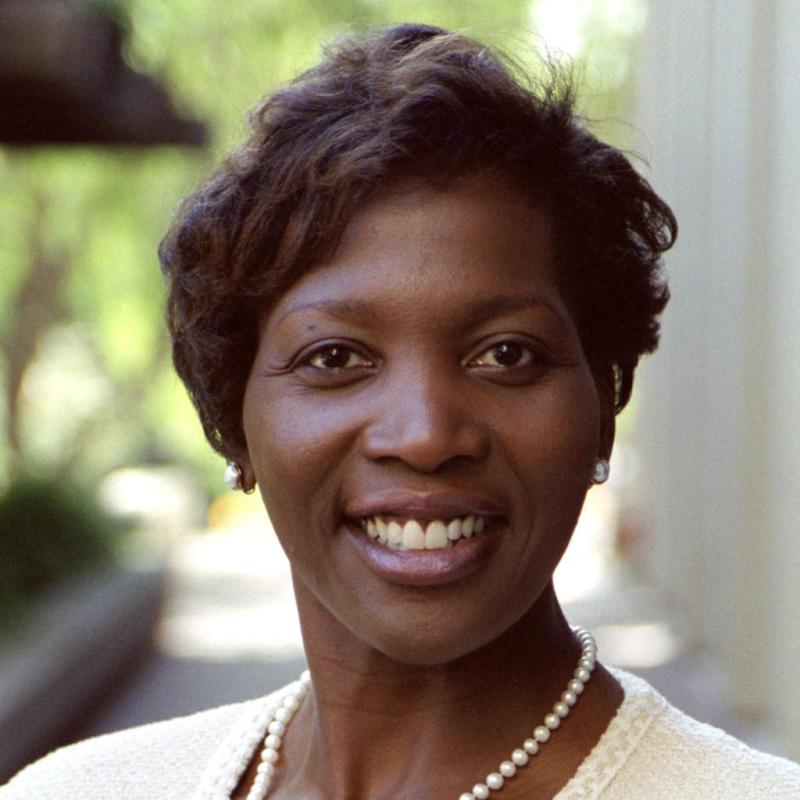
Lisa Cook, Michigan State University
Date: Friday, May 15 2020, 12:00-1:15 PM EST
Youtube Live: Link
Lisa D. Cook is Professor of Economics and International Relations at Michigan State University. She earned a Ph.D. in economics from the University of California, Berkeley with fields in macroeconomics and international economics. Previously, she was on the faculty of Harvard University's Kennedy School of Government. Her current research interests include economic growth and development, innovation, and financial crises. She has been published in the American Economic Review, the Journal of Economic Growth, among other journals, and is an associate editor of the Journal of Economic Literature and the Journal of Economic History. Dr. Cook has been funded by NSF and the National Bureau of Economic Research, among others. She is currently Director of the American Economic Association Summer Program and a Research Associate at the National Bureau of Economic Research. She served in the Obama White House at the Council of Economic Advisers from 2011 to 2012.
Mobile Money and the COVID-19 Crisis
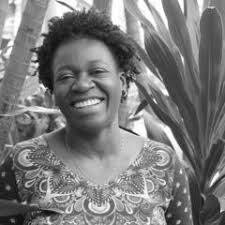
Special Talk: Araba Sey, United Nations University
Date: Friday, April 24 2020, 12:00-1:15 PM EST
Reflections on the talk: Medium
Araba Sey is a Principal Researcher with Research ICT Africa. She studies the relationship between information and communication technologies (ICTs) and society with a focus on socio-economically marginalized groups. She has led several research projects on the impacts of computers, mobile phones and internet access in a variety of international contexts. Her research seeks to understand the factors that underlie different types of digital inequality and explore ways to foster diversity and inclusion. Her most recent work focused on gender equality in digital access, digital skills and leadership in the technology industry.
What Not to Expect (from ICTD research and interventions)

Jim Leape, Stanford University
Date: Friday, March 6 2020, 12:00-1:15 PM EST
Youtube Live: Link
Reflections on the talk: Medium
Jim Leape is the William and Eva Price Senior Fellow in the Stanford Woods Institute for the Environment, and co-director of the Stanford Center for Ocean Solutions. Through research, writing and direct engagement with private and public sector leaders, Jim looks at how to drive large-scale systemic shifts to sustainability. Jim has more than three decades of conservation experience. From 2005 to 2014, he served as Director General of WWF International and leader of the global WWF Network, one of the world's largest conservation organizations. Previously, he worked at the David and Lucile Packard Foundation; WWF-US in Washington, D.C.; and the United Nations Environment Programme in Nairobi, Kenya. Jim serves on several boards. From 2007 to 2017, he was a member of the China Council for International Cooperation in Environment and Development, which advises the Premier of China. He received an A.B. with honors from Harvard College and a J.D. with honors from Harvard Law School.
Harnessing Global Markets for a Transition to Sustainability
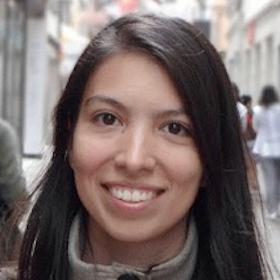
Elisa Celis, Yale University
Date: Friday, December 6 2019, 12:30-2:00 PM EST
Link: Youtube Live
Elisa Celis is an Assistant Professor in the Statistics and Data Science department at Yale University. Her research focuses on problems that arise in the context of the Internet and its societal and economic implications. She approaches these problems by using both experimental and theoretical techniques. Her work spans multiple areas including social and computing crowdsourcing, data and network science, and mechanism design and algorithm with a current emphasis on fairness and diversity in artificial intelligence and machine learning. She has published articles in journals such as IEEE Transactions on Network Science and Engineering, Journal of Applied Network Science, Human Computation Journal, Management Science, SIAM Journal on Computing, among others. Before coming to Yale, she worked at the Ecole Polytechnique Federale de Lausanne as a senior research scientist since June of 2014. Celis holds a Ph.D. in Computer Science and Engineering and an M.Sc. in Mathematics, both from the University of Washington.
Mitigating Discrimination in Online Advertising

Pauline Kim, Washington University in St. Louis
Date: Friday, November 15 2019, 12:00-1:30 PM EST
Link: Youtube Live
Pauline Kim is the Daniel Noyes Kirby Professor Washington University Law School in St. Louis. She is a nationally recognized expert on the law governing the workplace and has written widely on issues affecting workers, including privacy, discrimination and job security, as well as the impact of technology in the workplace. Her research focuses on the risks of unfairness and bias as automated decision-processes are incorporated into firms' personnel decision-making and the legal challenges posed by these technological developments. She is studying the role of technological intermediaries in shaping labor markets, and the possibilities for artificially intelligent systems to avoid human biases in making personnel decisions. She is a graduate of Harvard and Radcliffe Colleges and Harvard Law School, and clerked for the Honorable Cecil F. Poole on the Ninth Circuit Court of Appeals. Following her clerkship, she worked as a staff attorney at the Employment Law Center/Legal Aid Society of San Francisco.
Manipulating Opportunity: Online Market Intermediaries and Risks of Discrimination
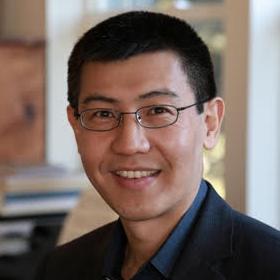
Kentaro Toyama, University of Michigan
Date: Friday, October 25 2019, 12:00-1:30 PM EST
Link: Youtube Live
Kentaro Toyama is W. K. Kellogg Professor of Community Information at the University of Michigan School of Information and a fellow of the Dalai Lama Center for Ethics and Transformative Values at MIT. He is the author of Geek Heresy: Rescuing Social Change from the Cult of Technology. From 2005-2009, Toyama was co-founder and assistant managing director of Microsoft Research India. There, he started the Technology for Emerging Markets research group, which conducts interdisciplinary research to understand how the world's poorest communities interact with electronic technology and to invent new ways for technology to support their socio-economic development. Prior to his time in India, Toyama did research in artificial intelligence, computer vision, and human-computer interaction at Microsoft and taught mathematics at Ashesi University in Ghana.
Lessons from ICTD -- Information & Communication Technologies and Development
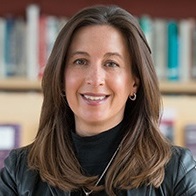
Justine Hastings, Brown University
Date: Friday, May 10 2019, 1:00-2:15 PM EST
Justine Hastings is a Professor of Economics and International and Public Affairs at Brown University and a Faculty Research Associate with the National Bureau of Economic Research. Her areas of expertise include research in Industrial Organization and Public Economics which address important economic and public policy questions. She has conducted academic research on topics such as market structure and competition, environment and energy regulation, advertising and consumer protection, consumer financial markets, health care, social safety-net programs, and markets for higher education. Her research employs diverse empirical techniques including field experiments, survey analysis, machine learning, predictive analytics, analysis of large administrative datasets, and structural demand and supply estimation. Her research was cited in the 2017 Nobel Prize scientific background materials, and has been used to shape public policy improvements around the world. Professor Hastings is the founding director of Research Improving People's Lives (RIPL), a nonprofit research institute using data and science to impact policy and improve lives.
Fact-Based Policy: How Do States and Local Governments Accomplish It?
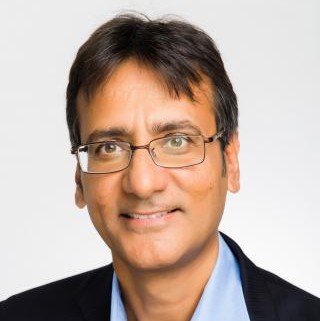
Rajiv Sethi, Barnard College, Columbia University
Date: Friday, April 5 2019, 1:00-2:30 PM EST
Link: Youtube Live
Rajiv Sethi is a Professor of Economics at Barnard College, Columbia University and an External Professor at the Santa Fe Institute. He has previously held visiting positions at Microsoft Research in New York City, and at the Institute for Advanced Study in Princeton. He is on the editorial boards of the American Economic Review and Economics and Philosophy. His current research deals with information and beliefs, including examining how stereotypes affect interactions among strangers, especially in relation to crime and the criminal justice system. He is also part of a large interdisciplinary team working on the forecasting of geopolitical events using methods that combine machine models with human judgment. Rajiv is a founding member of CORE (Curriculum Open-Access Resources for Economics), a group of scholars engaged in the production of high-quality freely-available resources for the teaching of economics.
The Geography of Lethal Force

Matthew Jackson, Stanford University
Date: Friday, March 1 2019, 1:00-2:30 PM EST
Link: Youtube Live
Matthew O. Jackson is the William D. Eberle Professor of Economics at Stanford University and an external faculty member of the Santa Fe Institute and a senior fellow of CIFAR. He was at Northwestern University and Caltech before joining Stanford, and received his BA from Princeton University in 1984 and PhD from Stanford in 1988. Jackson's research interests include game theory, microeconomic theory, and the study of social and economic networks, on which he has published many articles and the books `The Human Network' and `Social and Economic Networks'. He also teaches an online course on networks and co-teaches two others on game theory. Jackson is a Member of the National Academy of Sciences, a Fellow of the American Academy of Arts and Sciences, a Fellow of the Econometric Society, a Game Theory Society Fellow, and an Economic Theory Fellow, and his other honors include the von Neumann Award, a Guggenheim Fellowship, the Social Choice and Welfare Prize, the B.E.Press Arrow Prize for Senior Economists, and teaching awards. He has served as co-editor of Games and Economic Behavior, the Review of Economic Design, and Econometrica.
Using Gossips to Spread Information: Theory and Evidence from Two Randomized Controlled Trials
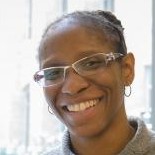
Tawanna Dillahunt, University of Michigan
Date: Friday, January 25th 2019, 1:00-2:30 PM EST
Tawanna Dillahunt is an Assistant Professor at the University of Michigan's School of Information and holds a courtesy appointment with the Electrical Engineering and Computer Science Department. Tawanna earned her Ph.D. in Human-Computer Interaction (HCI) from Carnegie Mellon University. She now leads the Social Innovations research group, an interdisciplinary group of individuals whose vision is to design, build, and enhance technologies to solve real-world problems affecting marginalized groups and individuals primarily in the U.S. Our current projects aim to address unemployment, environmental sustainability, and technical literacy by fostering social and sociotechnical capital within these communities.
Designing and Envisioning Digital Tools for Low-resource Job Seekers

Alvin Roth, Stanford University
Date: Thursday, December 13th 2018, 12:00-1:30 PM EST
Link: Youtube Live
Al Roth is a professor of Economics at Stanford. He shared the 2012 Nobel prize in Economics for "the theory of stable allocations and the practice of market design".
Market design is more complicated than mechanism design. And so is achieving good social outcomes.
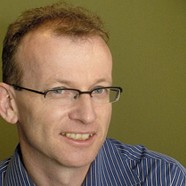
Canice Prendergast, University of Chicago
Date: Monday, November 12th 2018, 1:00-2:30 PM EST
Link: Youtube Live
Canice Prendergast is the author of "The Limits of Bureaucratic Efficiency" published in the Journal of Political Economy in 2003 and "The Tenuous Trade-Off Between Risk and Incentives" that appeared in the Journal of Political Economy in 2002. Prendergast is widely published, with work appearing in the Economic Journal, the Journal of Labor Economics, the American Economic Review, the Journal of the Japanese and International Economics, and the European Economic Review. Articles on his recent research have appeared in Fortune Magazine, the Financial Times, the Economist, and Der Spiegel.